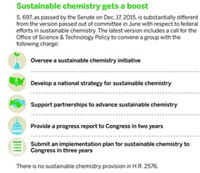Advertisement
Grab your lab coat. Let's get started
Welcome!
Welcome!
Create an account below to get 6 C&EN articles per month, receive newsletters and more - all free.
It seems this is your first time logging in online. Please enter the following information to continue.
As an ACS member you automatically get access to this site. All we need is few more details to create your reading experience.
Not you? Sign in with a different account.
Not you? Sign in with a different account.
ERROR 1
ERROR 1
ERROR 2
ERROR 2
ERROR 2
ERROR 2
ERROR 2
Password and Confirm password must match.
If you have an ACS member number, please enter it here so we can link this account to your membership. (optional)
ERROR 2
ACS values your privacy. By submitting your information, you are gaining access to C&EN and subscribing to our weekly newsletter. We use the information you provide to make your reading experience better, and we will never sell your data to third party members.
Policy
Congress moves to overhaul law to improve chemical safety
EPA to get new authority to regulate toxic substances
by Britt E. Erickson
May 25, 2016
| A version of this story appeared in
Volume 94, Issue 22

U.S. lawmakers have agreed on landmark bipartisan legislation to modernize the Toxic Substances Control Act (TSCA), a 40-year-old law that governs chemicals used in household items and industrial products.
After years of negotiations, the House of Representatives passed the legislation (H.R. 2576) on May 24 by a vote of 403-12.
The Senate is expected to follow suit in early June, sending the measure to the President, who is likely to sign it. The White House says the bill meets the Obama Administration’s principles for reforming TSCA.
TSCA at a glance
Congress is modernizing the U.S. chemical control law. New legislation will
▸ preclude EPA from considering costs and benefits when evaluating the safety of chemicals,
▸ authorize EPA to order chemical manufacturers to provide safety data,
▸ require EPA within three-and-a-half years to begin evaluating at least 20 chemicals already in commerce that pose a high risk to human health or the environment,
▸ allow EPA to collect fees from chemical manufacturers to review new and existing chemicals,
▸ require EPA to review and substantiate most new and past claims of confidential business information that can keep a chemical’s identity from public view, and
▸ preserve state actions taken before April 22, 2016.
In a major change from current law, the legislation will make it easier for the Environmental Protection Agency to request safety data from chemical manufacturers on new and existing substances that may pose a risk to human health or the environment. Currently, EPA must demonstrate that a chemical poses a risk before it can seek such information through a regulation.
The legislation will allow EPA to collect fees from industry to pay for federal chemical safety evaluations. It also will require the agency to review all confidential business information claims regularly attached to chemical information that industry submits to EPA. Such claims often hide the identity of chemicals from public view.
One of the most contentious parts of the bill is a provision that allows EPA action to override state actions. In the absence of federal rules, some states have regulated toxic chemicals. The legislation allows state actions taken before April 22, 2016, to stand.
A handful of Democrats in the House and many environmental and public health groups oppose the bill primarily because of the state preemption provision.
The bill “improves current law in many ways and, depending on implementation by EPA, should do some good,” says Andy Igrejas, national campaign director for the advocacy group Safer Chemicals, Healthy Families. “Unfortunately, it still goes backward in a few important ways that reflect the enormous lobbying and political strength of the chemical industry,” Igrejas says. In particular, it curbs state authority and weakens EPA’s authority to intercept imported products that contain toxic chemicals, he says.
Earlier this month, Sen. Barbara Boxer (D-Calif.), a key congressional player in TSCA reform, announced her support for the bill after fighting for many years for the rights of states. “Under our agreement, the states are free to act on any chemical until EPA takes a series of steps to regulate a specific chemical,” she said.
Now that Boxer’s fight about state preemption is over, Senate passage of the bill is all but certain.
The chemical industry strongly supports the bill, saying the changes will rebuild public confidence in the safety of chemicals in commerce. Cal Dooley, chief executive officer of the American Chemistry Council, which represents much of the U.S. chemical industry, says the legislation is “a true compromise that balances the interests of multiple stakeholders.”




Join the conversation
Contact the reporter
Submit a Letter to the Editor for publication
Engage with us on Twitter